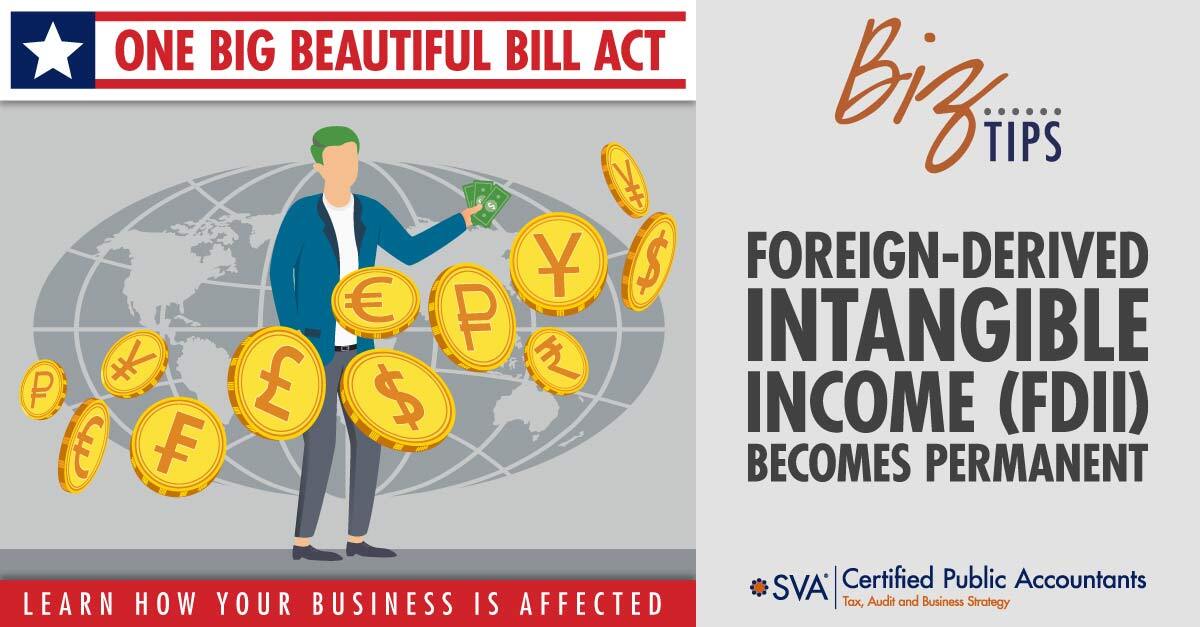| Highlights: |
- Explains how the One Big Beautiful Bill Act (OBBBA) permanently enshrines the Foreign-Derived Intangible Income (FDII) regime while updating the tax rules for U.S. corporations with foreign customers.
- Summarizes key changes beginning after 2025, including renaming FDII to Foreign-Derived Deduction Eligible Income (FDDEI), a lower deduction rate, and elimination of certain calculation adjustments.
- Advises business owners to model the impact of the new FDDEI rules on tax liabilities and review expense allocations to optimize deductions under the revised international tax framework.
|
The One Big Beautiful Bill Act (OBBBA) locks in the Foreign-Derived Intangible Income (FDII) regime for the long term, but it also includes some important updates that could affect how U.S. corporations with foreign customers calculate and report their taxes.
(Download Video Transcript)
A Quick Refresher on FDII
FDII was originally designed to encourage U.S. companies to export goods and services from within the United States rather than moving operations overseas. It provided a tax break on certain export-related income, especially income tied to intangible assets like patents, software, and proprietary processes.
Before OBBBA:
- U.S. corporations could take a 37.5% deduction on FDII, resulting in an effective tax rate of 13.125%.
- The calculation started with deduction-eligible income (DEI), then determined deemed intangible income (DII) and applied a foreign-derived ratio.
- A 10% return on Qualified Business Asset Investment (QBAI) was subtracted from DEI, limiting the FDII benefit for companies with significant tangible assets.
- Interest expense and research & experimentation (R&E) expenses were allocated to DEI, which reduced the portion of income qualifying for FDII.
What OBBBA Changes
Under OBBBA, FDII is now officially Foreign-Derived Deduction Eligible Income (FDDEI), and several key modifications apply starting with tax years after December 31, 2025:
| Permanent But Higher Effective Tax Rate |
The Section 250 deduction drops from 37.5% to 33.34%, raising the effective tax rate from 13.125% to roughly 14%. |
| Interest and R&E Expenses No Longer Reduce FDDEI |
These expenses are no longer allocated against FDDEI, which may allow more income to qualify for the deduction. |
| Expand the Exceptions to DEI |
Gains from selling intangible or depreciable property after June 16, 2025, are excluded from DEI calculations. |
| No More QBAI Reduction |
The 10% QBAI subtraction is eliminated, meaning returns from tangible assets now count toward FDDEI. This expands the benefit to more asset-intensive industries, not just those focused on intangibles. |
How This Affects Business Owners
For U.S. corporations with foreign sales, the FDDEI deduction remains a valuable export incentive, but it comes with trade-offs. The reduced deduction percentage will slightly increase the tax rate on qualifying income.
However, removing the QBAI exclusion and interest/R&E expense allocations could expand the amount of income eligible for the deduction, particularly benefiting manufacturers and other asset-heavy sectors.
What to Do Now
| Run the Numbers |
Model how the new FDDEI rules affect your business, factoring in both the higher effective tax rate and the potentially larger qualifying income base. |
| Review Your Expense Allocations |
With interest and R&E no longer reducing FDDEI, your existing calculations may need updates. |
| Identify New Opportunities |
Asset-intensive industries may find that the elimination of the QBAI reduction makes FDDEI far more advantageous than before. |
FDII may have a new name and a slightly higher rate, but the OBBBA changes could make it more valuable for many exporters. With more income now eligible, it’s worth reviewing your numbers to see how your business can benefit.
© 2025 SVA Certified Public Accountants

